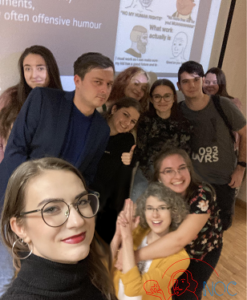
Gratulacje! 🎉🥳 Dr Joanna Ryszka! 🎓 💕
W tym miesiącu członkowie naszego Koła szaleją 💪🏻 — to już trzecia obrona!
Z radością informujemy, że wieloletnia Przewodnicząca NEOlinguists obroniła dzisiaj swoją pracę doktorską zatytułowaną “The impact of the British-Japanese relations on British English: a diachronic sociolinguistic study”.
Joanno, Szanowna Pani Doktor! 👩🏼🎓 Serdecznie gratulujemy i jesteśmy niezwykle dumni, że mogliśmy dzielić z Tobą radości i smutki związane ze studiami doktoranckimi. 🩷 Jesteś wspaniałą osobą i ambitną naukowczynią — zarażasz optymizmem oraz pasją, motywując nas wszystkich 🥰 Od lat jesteś paliwem naszego Koła; mamy nadzieję, że to się nie zmieni teraz, kiedy zostaniesz jego członkinią honorową 👸🏼 . Dalsza współpraca z Toba zarówno na gruncie naukowym jak i popularyzatorskim będzie dla nas zaszczytem oraz czystą przyjemnością! 🤩
Jeszcze kilka słów od obecnej przewodniczącej, Marleny Moskal:
Joanno, wiele z nas (w tym również ja!) podjęło studia w Szkole Doktorskiej dzięki Twojemu wsparciu. Dziękujemy za wiarę w nas oraz wszelką okazaną pomoc, która była i jest bezcenna. 💕 Uczelnie potrzebują właśnie takich osób jak Ty. Postaram się godnie kontynuować Twoje dzieło, jednak będzie to trudne, ponieważ ustawiłaś poprzeczkę niezwykle wysoko!
Jeszcze raz gratulujemy i dziękujemy za wszystko! Oczywiście dalej działamy razem, bo jak już wiesz — tak łatwo się nas nie pozbędziesz 😜.
Twoje NEOnki ✨




